In some cases, a medical problem that your child suffers from may need treatment before you try to tackle your child’s bedwetting.
While these can include temporary health problems such as a bladder infection (UTI) or constipation, a longer-term health issue or disability can also affect your child’s ability to be dry at night.
Bedwetting and learning disabilities
There has not been a great deal of research into assessing and treating enuresis (bedwetting) in children with learning disabilities, so parents may have a lot of questions that can’t always be answered.
A study in Naples in 2011 that looked at the numbers of children in a group who experienced bedwetting, however, did show that a far larger number of the children wet the bed if they also had learning difficulties.
However, the two things are not correlated. So, if your child wets the bed, they may not have a learning disability, though a child with learning disabilities is more likely to have enuresis.
Does age matter at all?
If your child with learning disabilities has
- reached the age of five
- is toilet trained during the day
- but still wets the bed at night
…you should talk to your health visitor or GP about this.
They may be able to offer some practical help or advice and put you in touch with other organisations with resources that can help you.
If your child has a disability such as Down’s Syndrome, for example, they should still be offered help with enuresis. You may find further help at the Down’s Syndrome Association.
If your child has ADHD, Action for Children has a great resource on how to understand their additional needs too.
What can parents do to help children with learning disabilities reduce their bedwetting?
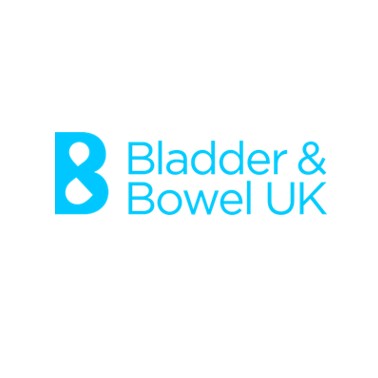
Fizzy drinks or ones containing caffeine can irritate the bladder. They can make it more likely to be ‘twitchy’ and therefore cause bedwetting or make it worse.
Not going to the toilet just before settling to sleep, drinking too much before bed or having salty or high protein food before bed can also cause bedwetting.
Six things that can help to make bedwetting better
Bladder and Bowel UK suggest the following things could help:
- Make sure your child goes to the toilet just before they go to sleep.
- Encourage your child to drink well during the day. Most school age children should drink about 1.5 litres of water-based drinks a day, divided between six to eight drinks.
- Fizzy or caffeinated drinks should be avoided.
- Try to stop all drinks and food in the hour before bedtime.
- Good bedtime routines and avoiding electronic screens in the hour before bed are important.
- Make sure your child is not constipated. Your GP, health visitor or school nurse can provide an assessment and suggest treatment if they are.
Bedwetting and neurodiversity

Neurodiversity is a term used to describe people who may interact with the world differently. Essentially, it refers to the concept that some developmental disorders are just normal variations of the brain.
Children who are somewhere on the autism spectrum, also known as Autism Spectrum Disorder (ASD), are one example of neurodiverse children. While autism is not a learning disorder, around half of autistic people may also have a learning disability.
Autism Spectrum Disorder (ASD) can range from mild to severe, with each child expressing it in their own way. Some children on the autism spectrum may also have problems with bedwetting at some time or another.
How to help neurodivergent children with bedwetting
Studies confirm that children with ASD are at greater risk of being impacted by enuresis and daytime urinary incontinence.
As with any child, you will need to be calm, patient and reassuring when helping your neurodivergent child through bedwetting. Remember: it’s all about helping and supporting your child at their pace, not yours.
Bedwetting and physical disabilities
The picture may be more complex in children with a physical disability. Depending on the nature of your child’s disability, they may be able to work towards staying dry at night, with help and support.
However, for some conditions, it may be far more difficult to plan towards a child who can stay dry at night. Children with conditions such as Fragile X and Rett syndromes have an increased risk for incontinence that can continue if left untreated.
Sleep and rest are affected by bedwetting
The problem of getting enough sleep can also affect some children with a physical disability.
A study in 2009 published in Physical & Occupational Therapy in Pediatrics said:
Caregivers of children with physical disabilities reported significantly greater concerns regarding general sleep problems, safety, and discomfort at night, night wakening, daytime irritability, interference with daytime activities and sleep-related health concerns in children with physical disabilities than in their counterparts.
The most frequently cited strategies to alleviate problems were the establishment of consistent routines and provision of calming, supportive sleep environments. Pediatric therapists need to assess and address sleep issues to promote the well-being of children and their families.
Tips and advice for managing bedwetting for kids with disabilities
For children with both physical and learning disabilities, parents can follow the same help and advice on staying dry at night as other parents. You just have to remember that their progress may be a little slower.
Make sure you create a relaxing bedtime routine for your child, introduce good, healthy bedtime habits, and learn all about which foods may help or harm bedwetting. Above all, patience is key—so make sure to look after yourself and your mental health too.
Plus, a few extra tips are always useful to keep in mind.
Tip #1: make sure your child is not constipated
Constipation can make bedwetting worse and some medication your child takes may also make them more likely to be constipated.
Check with your doctor if your child would benefit from a gentle, regular laxative to keep their bowel movements soft and regular.
Make sure you offer water, whole grain foods and fruit and vegetables too.
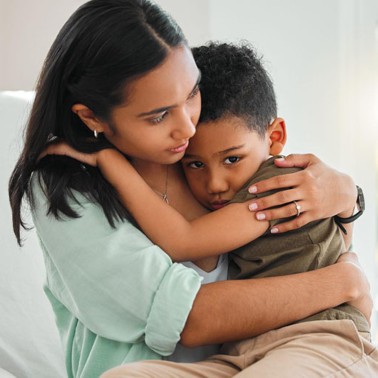
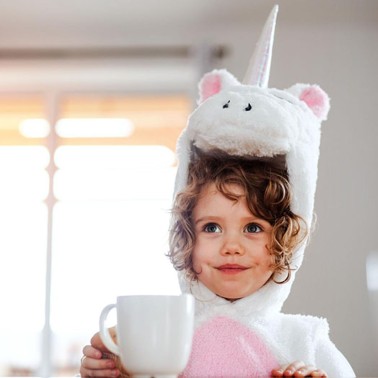
Tip #2: Don’t give your child drinks with caffeine in them and stay away from fizzy drinks.
We know that caffeine can increase the chance of your child wetting the bed at night.
Make sure you don’t give your child coffee, tea or cola and steer clear of carbonated drinks too.
Energy drinks are especially bad.
Tip #3: Keep your child well hydrated—just not too late!
It’s a bit of a juggling act. You need your child to be well hydrated, so you should offer plenty of water and diluted juice during the day.
However, you don’t want them drinking too much in the evening, leading to a full bladder at night and the potential that your child may not make it to the loo in time.
So don’t give them a big drink in the evening and if they are thirsty, give them a couple of mouthfuls of water instead, just before bed.
Make sure they have a last trip to the loo before bed, too!
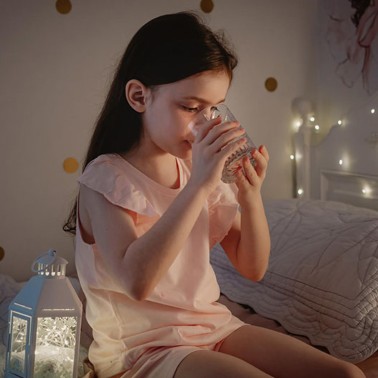
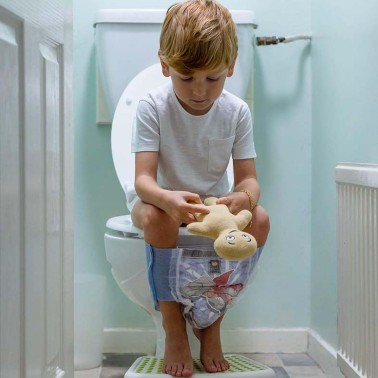
Tip #4: Make sure your child is comfy and spends enough time on the loo
We all use the loo more effectively if we are comfortable.
Make sure your child feels secure and can sit with their feet well supported.
You may need to use a toilet training seat and a step stool for this, so keep them next to the loo and ready to use.
This is especially important if your child’s disability leads to a balance problem.
In addition, make sure that your child never feels rushed and is given time to completely empty their bladder.
Tip #5: Consider how your child’s needs might affect their bedwetting
Your child has specific needs that other children and their parents might not need to consider.
For instance, their needs may mean they are more likely to get urinary tract infections (UTIs), which may affect their bedwetting.
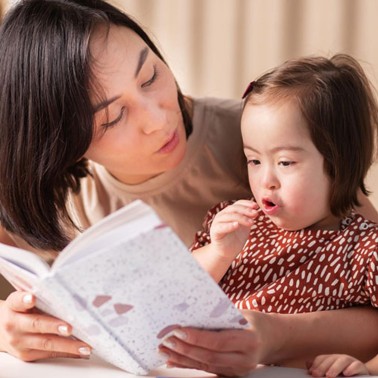
In the meantime, using DryNites® Pyjama Pants and Bed Mats can help all the family sleep well and your child stay comfortable during the night, even if they do have an accident.
Support your disabled child as they grow and develop
When your child is young, you may choose to use DryNites® Pyjama Pants to ensure they get a good night’s sleep, even if they are not yet able to control their night-time dryness.
As your child grows, they may still need to manage nocturnal enuresis as an older child or adult. They may also find that their Pyjama Pants get a little snug. When that time comes, it may be time to explore our range of Depend continence products.
Above all, your child may take a little longer than their peers to be dry at night but many children with physical and learning disabilities can get there in time. It’s important to stay positive, supportive and encouraging and to give your child the help and support they need.
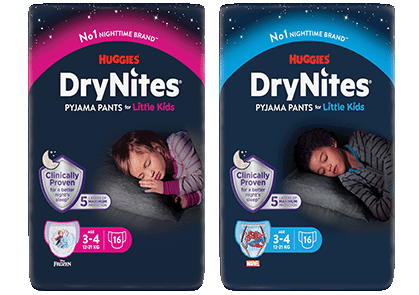


 your parenting partner
your parenting partner